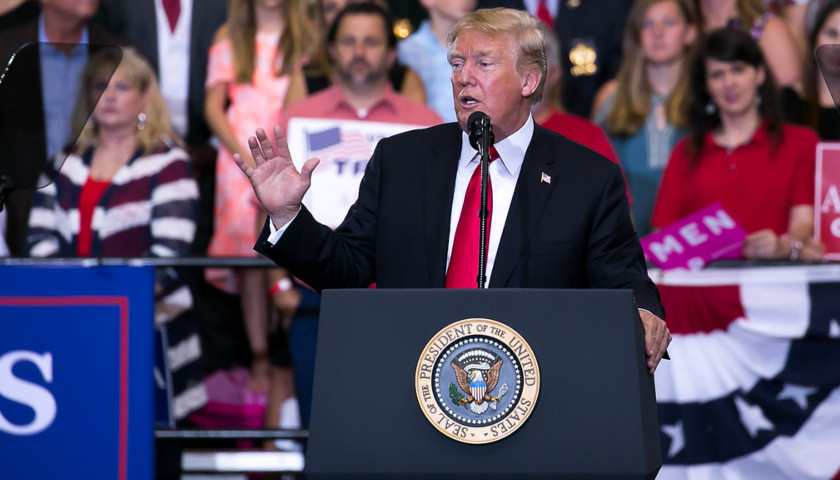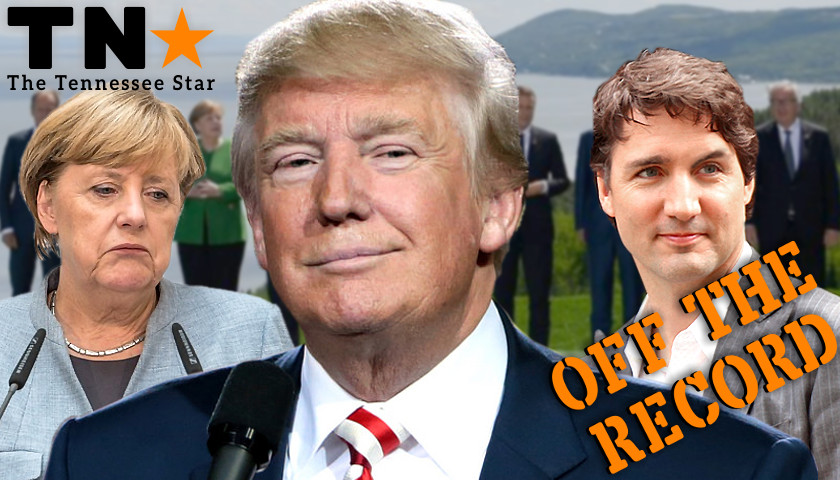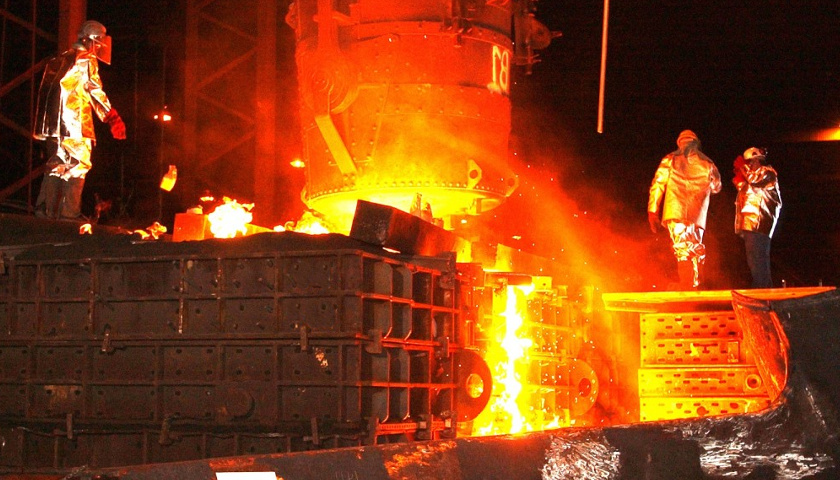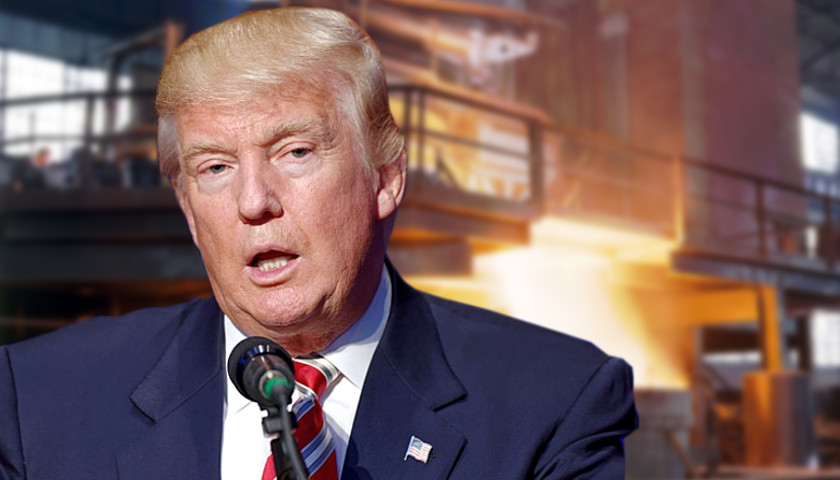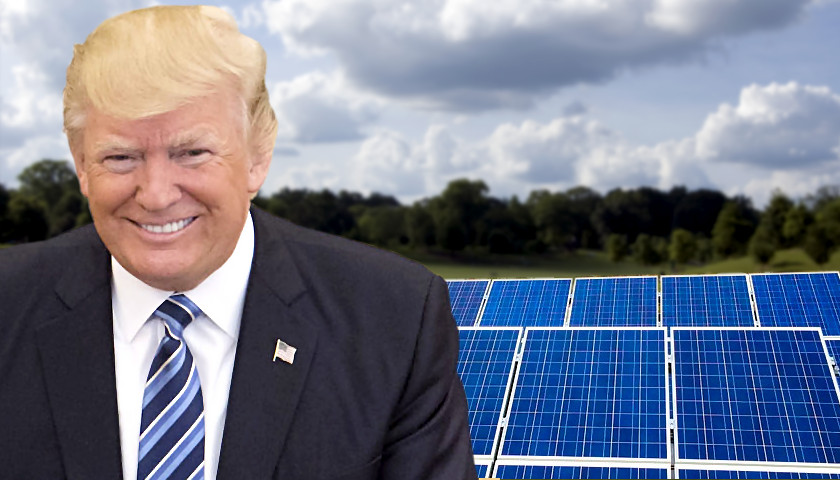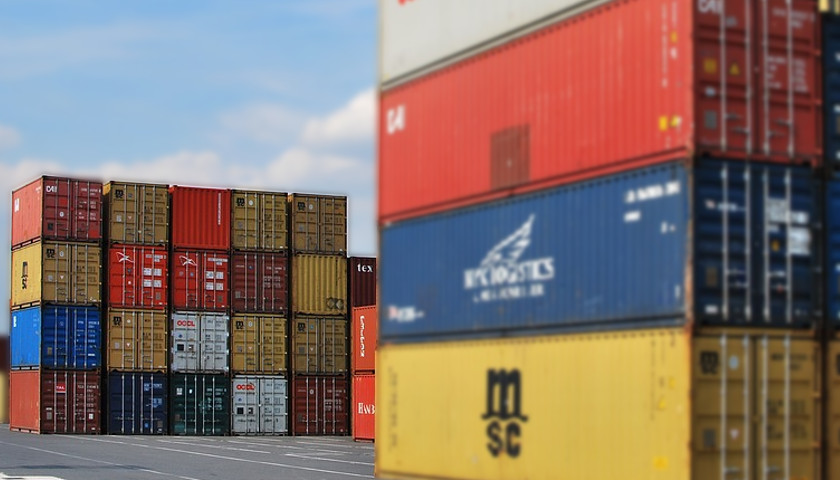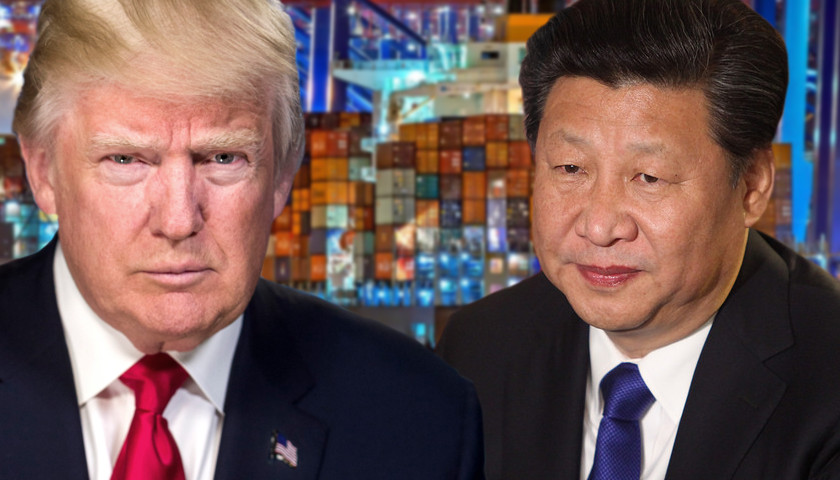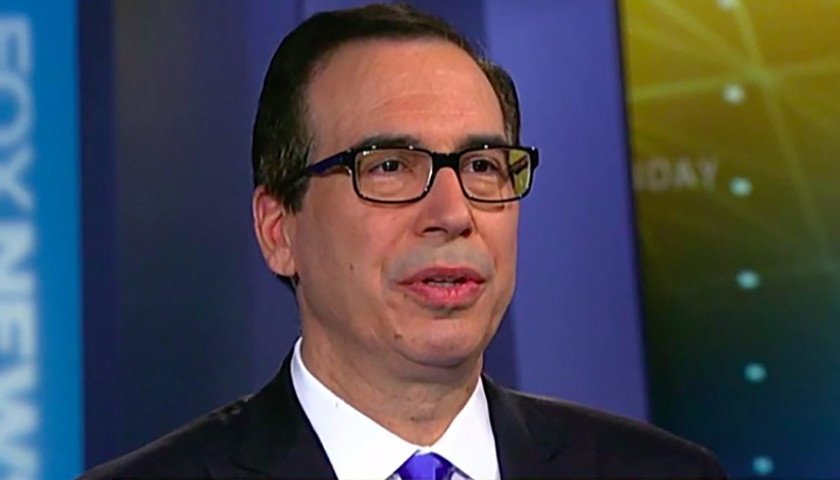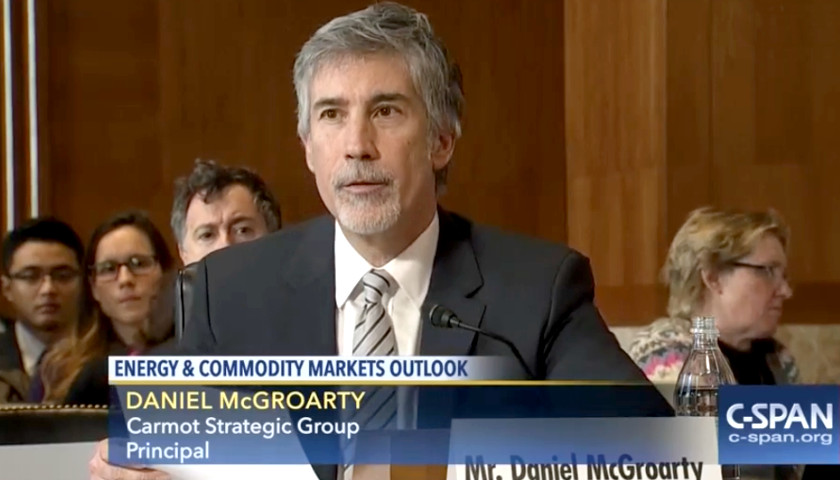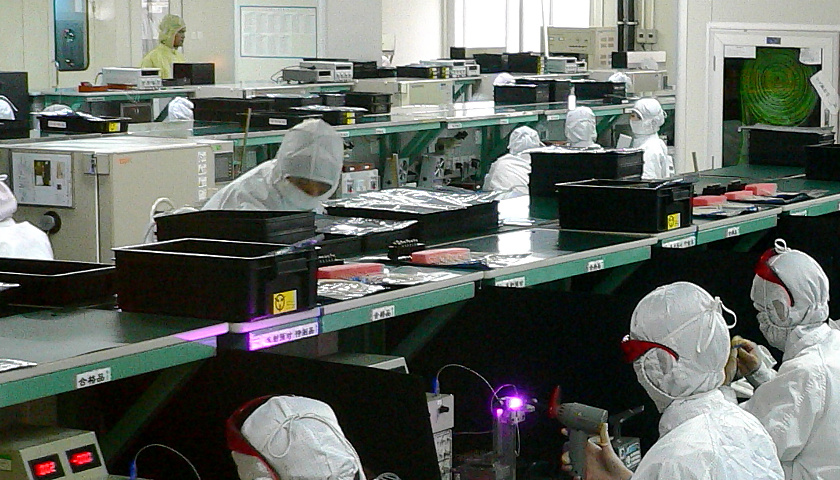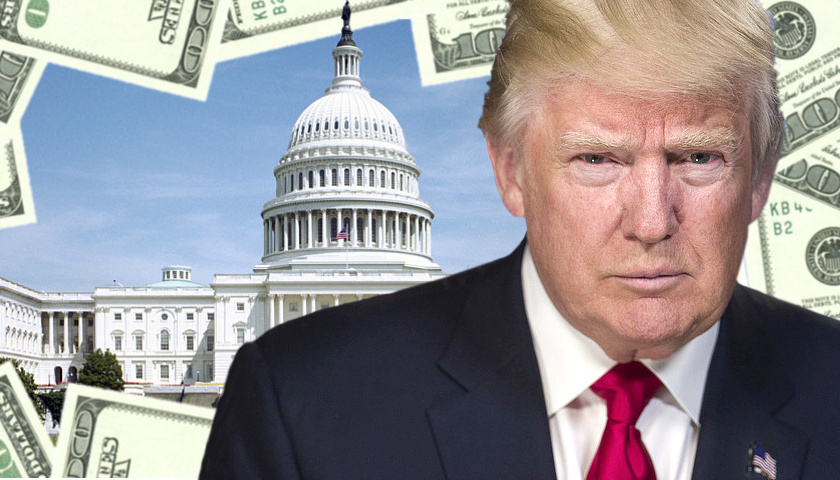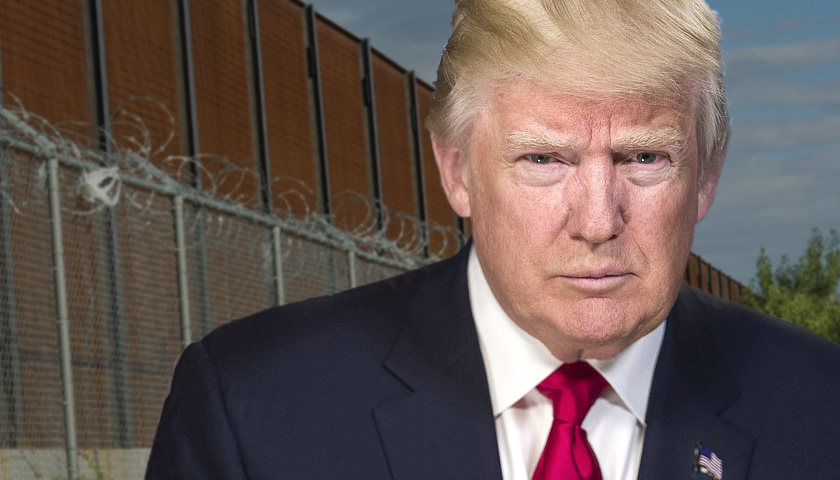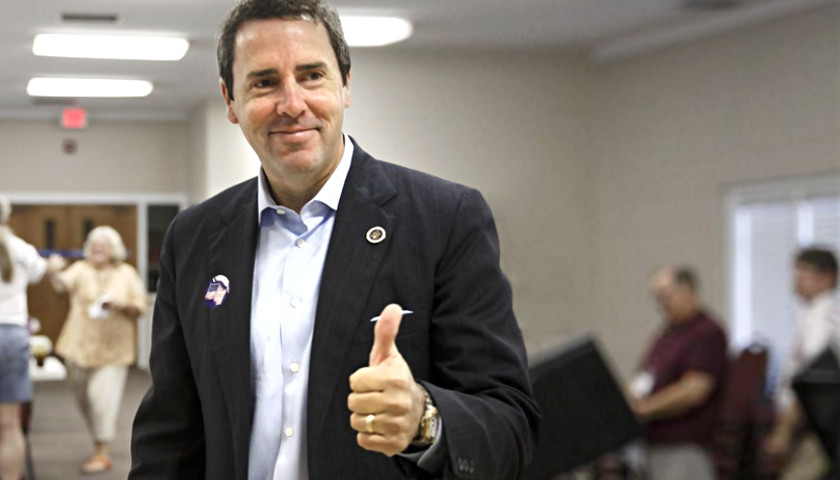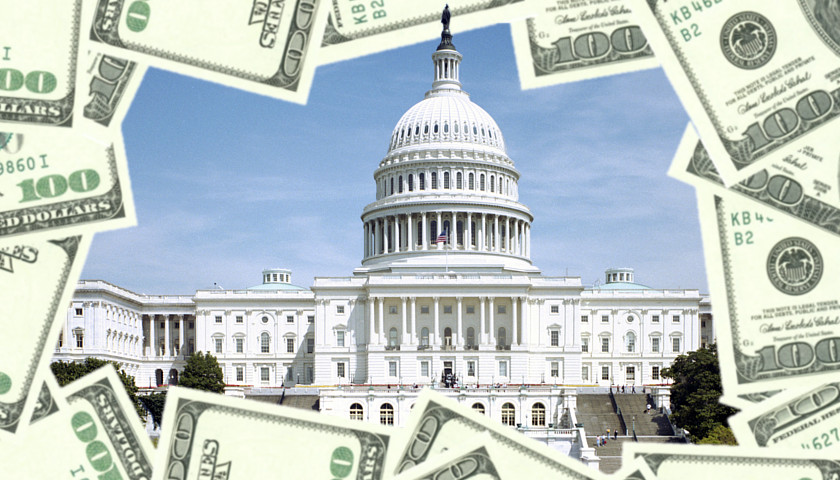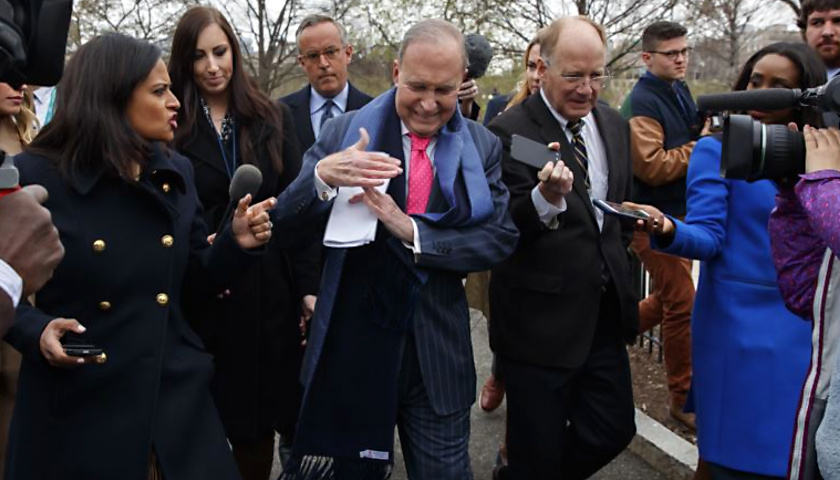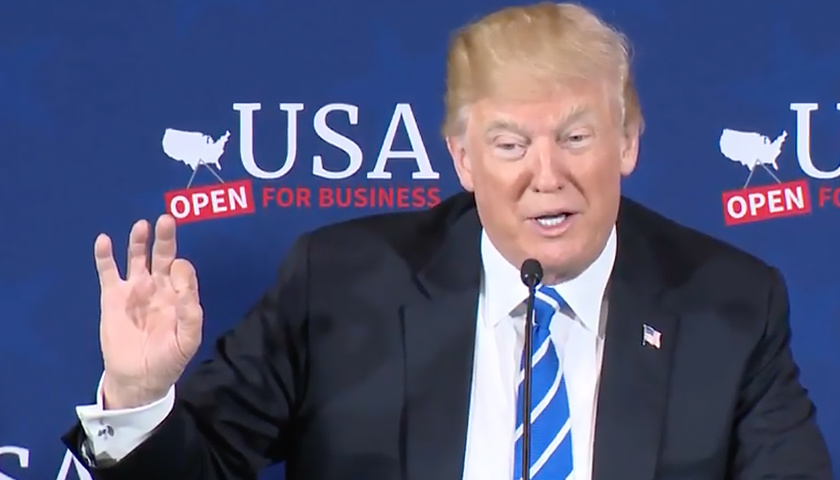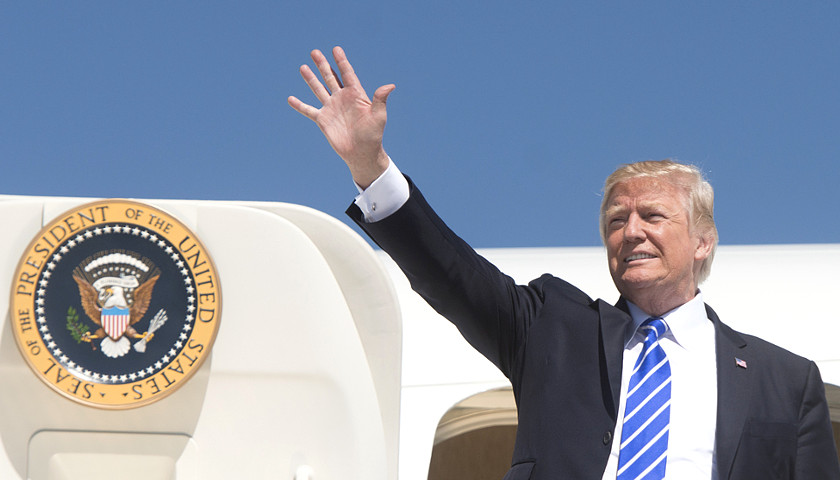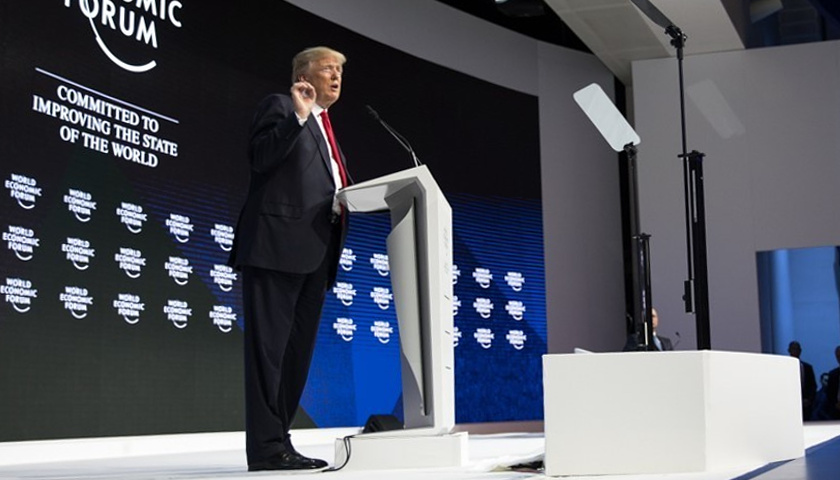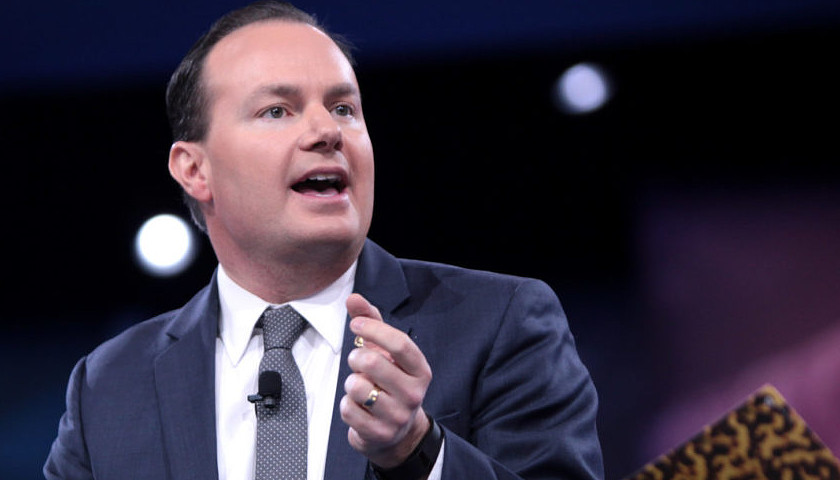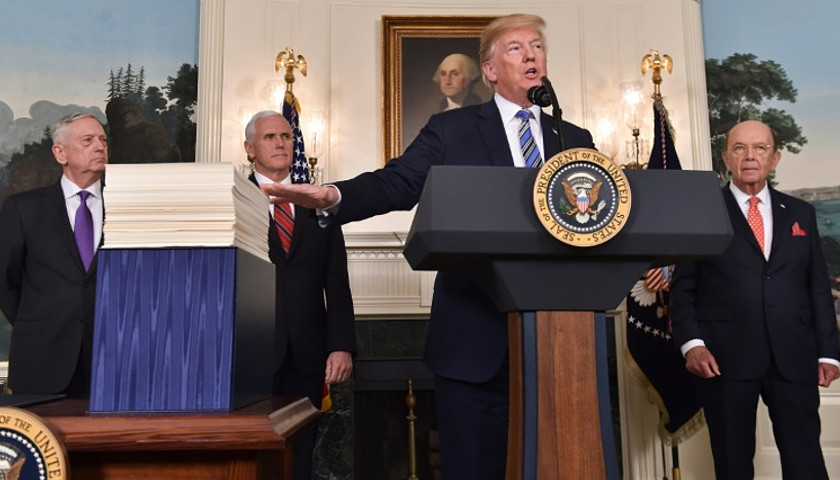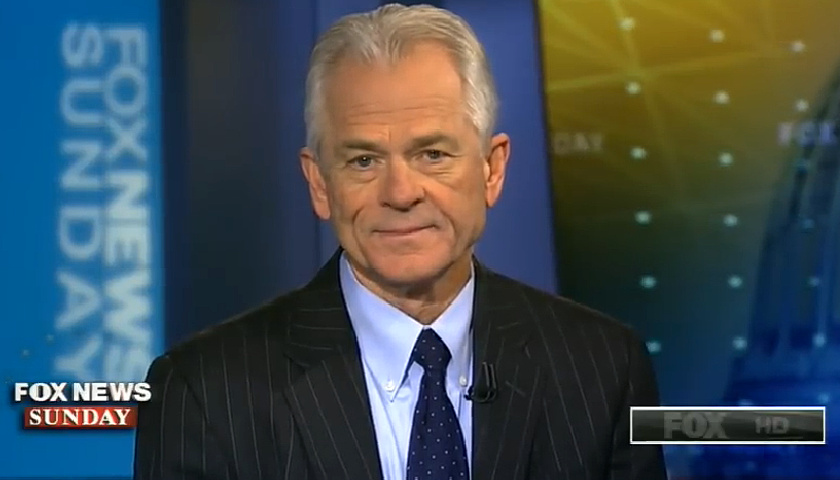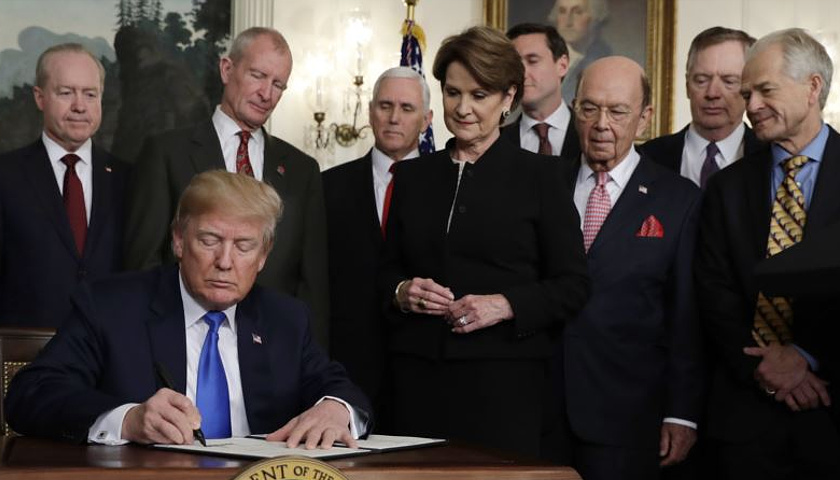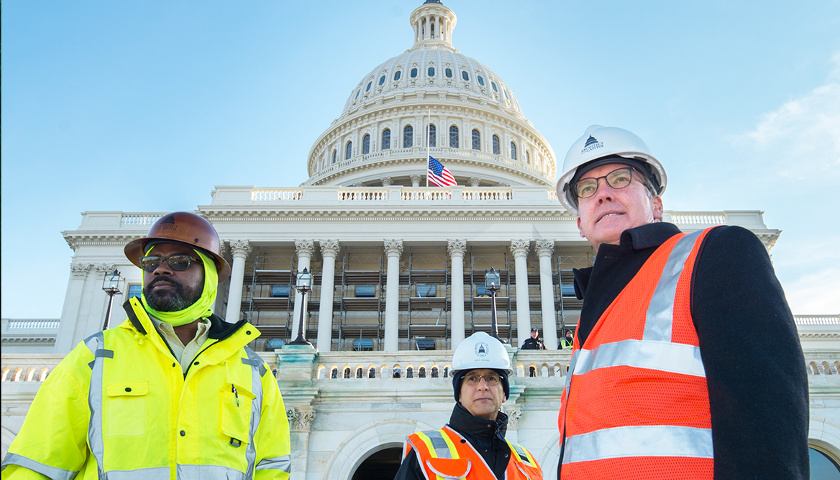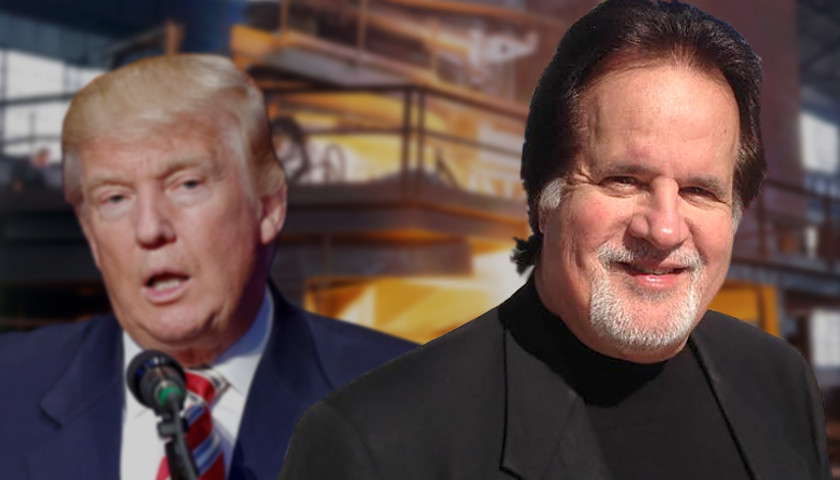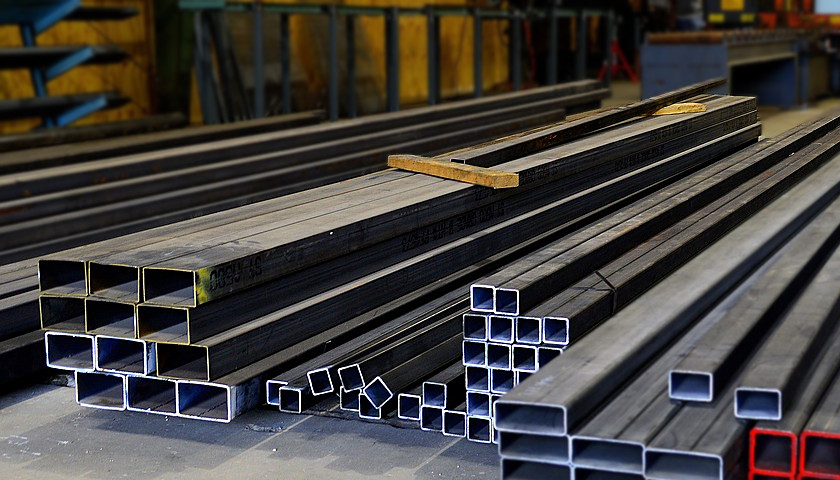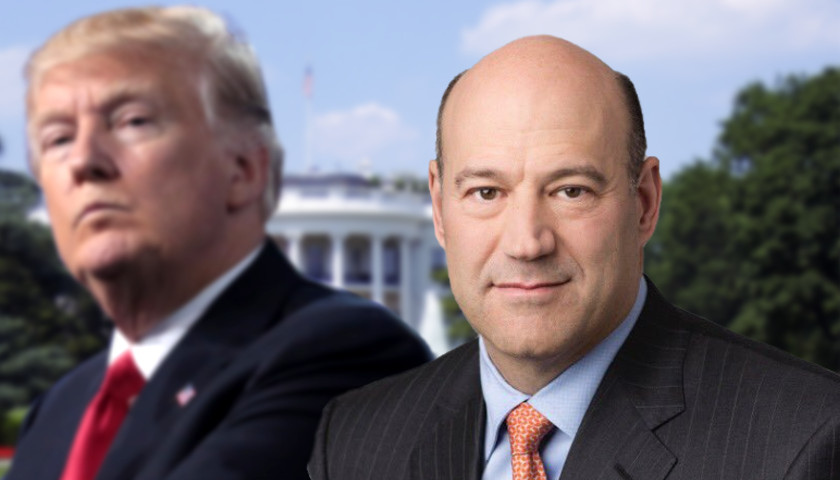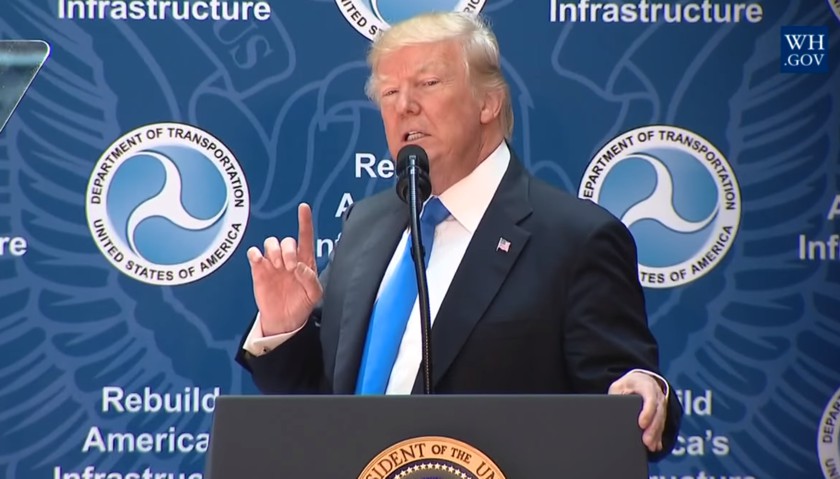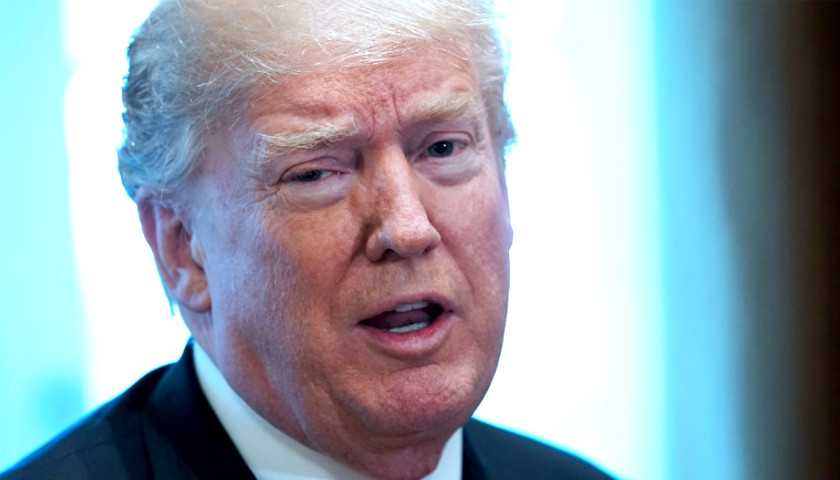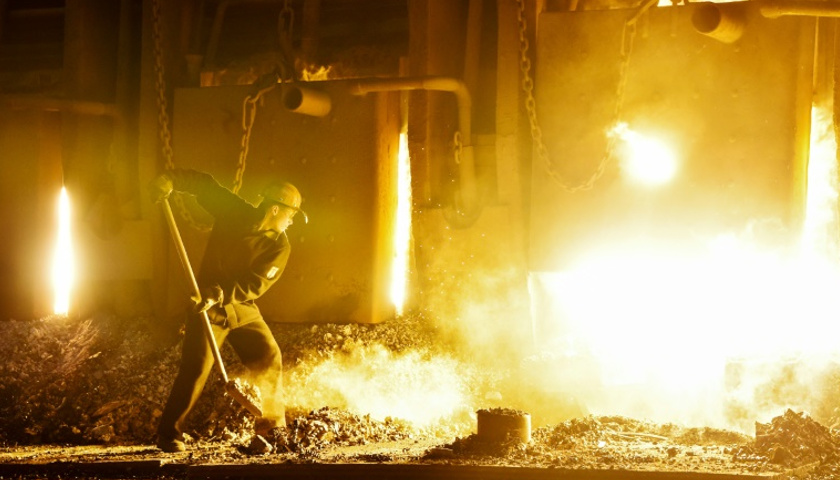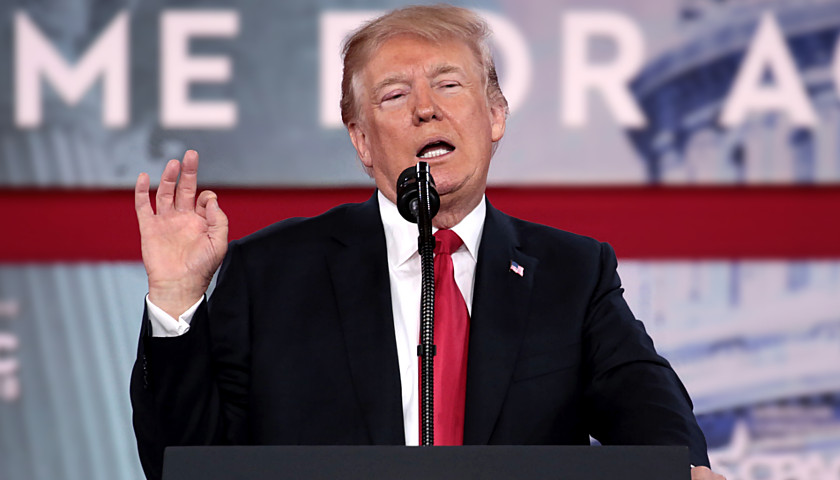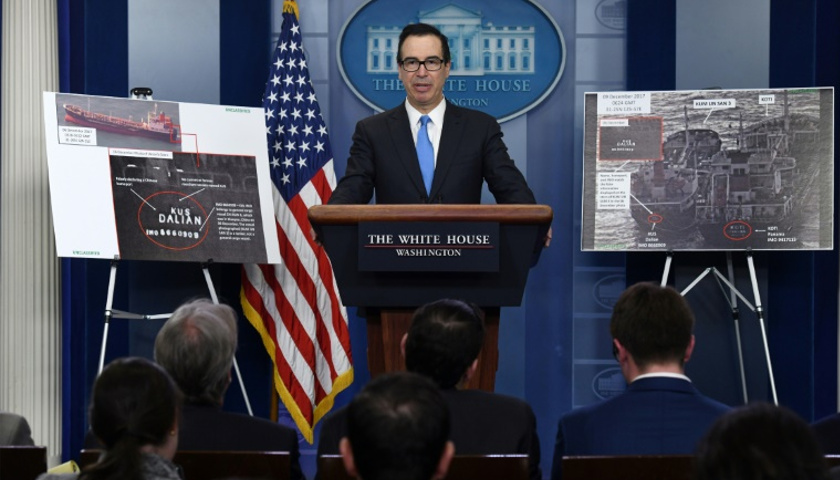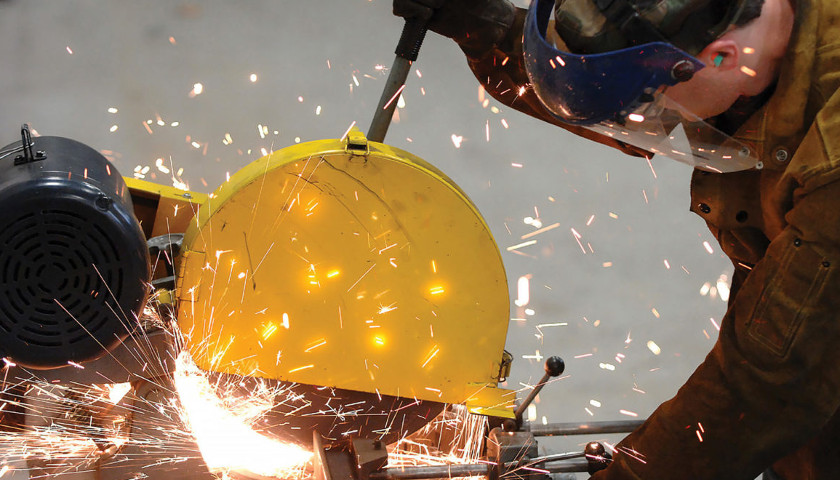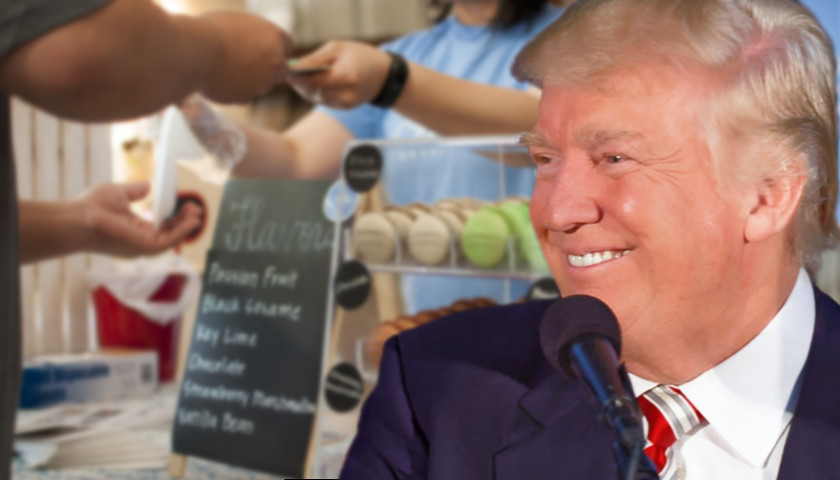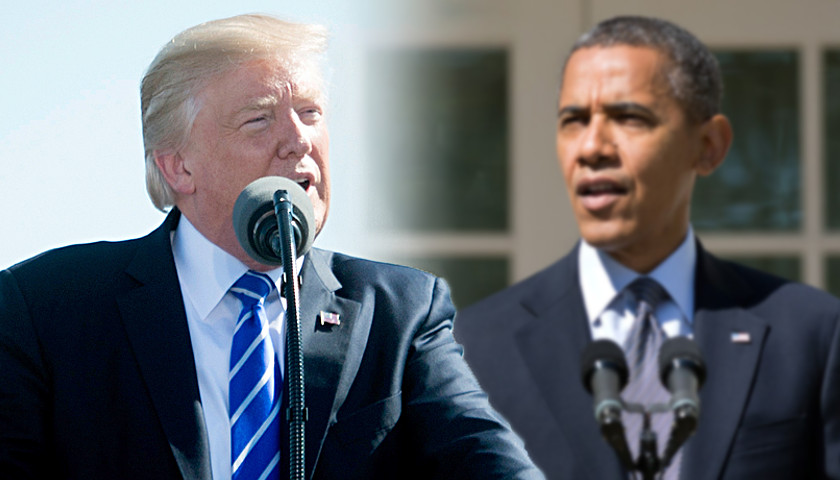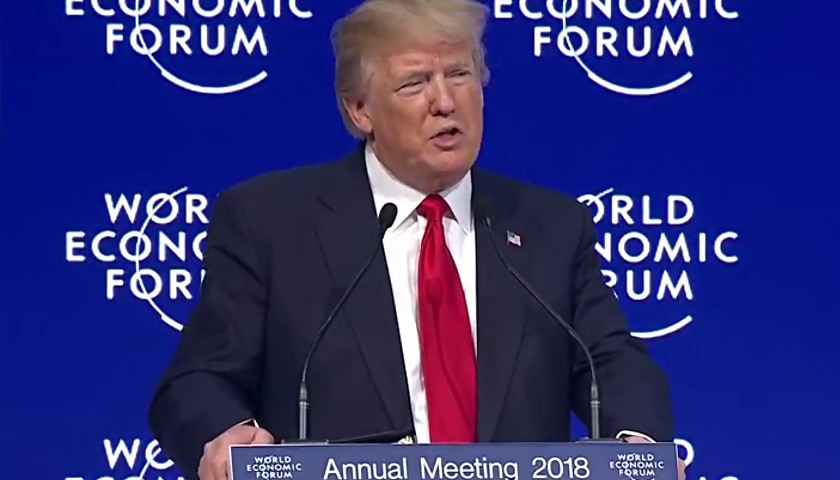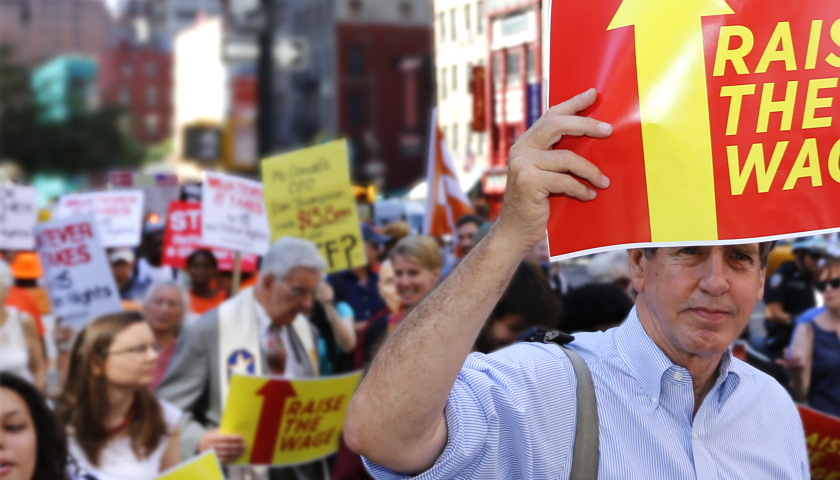By Robert Romano When President Donald Trump stood for election in 2016, he set a national goal of getting the U.S. economy to grow 4 percent annually, and maybe even greater than that. Speaking to the Economic Club of New York on Sept. 15, Trump said, “it’s time to establish a national goal of reaching 4 percent of economic growth. And my great economists don’t want me to say this but I think we can do better than that.” It’s a good goal for the nation to have. The economy has not grown above an inflation-adjusted 4 percent since 2000, and not above 3 percent since 2005. Which makes it good news that the Atlanta Federal Reserve is projecting 4.8 percent growth annualized for Q2. At the current point, the American people would be happy just to get to 3 percent. But in 2017, the economy fell short, only growing at 2.3 percent. And in the first quarter of 2018, it is only grew at 2.2 percent annualized. Meaning to get back on track for 2018 with a target above 3 percent, the economy will need to grow at 4.1 percent annualized in the second quarter, according to an analysis of Bureau…
Read the full storyTag: economy
OFF THE RECORD: President Trump Singlehandedly Delivers the Most Eyebrow-Raising G7 Trade Summit Ever
After years of mundanity surrounding the G7 world trade summit – the once-a-year snore-fest where the six, or seven, (or eight) leaders of the West come together as frenemies to see who can pick each others’ pockets most stealthily – we were treated to perhaps the most entertaining piece of political theater the world has ever seen. The excitement began when President Trump arrived. Last year, you’ll remember he made headlines over his ‘step aside‘ moment caught on camera. And you might also remember that – apart from the typical preening over ‘climate change’ initiatives like the Paris Accord (and the United States’ refusal to sign on) – the meeting came and went without much notice. Heck – even the protesters didn’t even bother to show up. The reason why is simple enough: this was President Trump’s first visit, and I suspect he wanted to do two things: (1) Observe; and (2) Give our trading partners a chance to do the right thing on their own. After all, that’s what friends do, right? Well, it’s a year later, and President Trump has been very vocal – some might even say notorious! – about his positions on trade. – America First –…
Read the full storyTennessee Adds 45,000 Jobs Over Past Year
Tennessee’s unemployment rates remain low and the state added 45,000 jobs the past year, the National Federation of Independent Business said. According to the March 2018 numbers from the Tennessee Department of Labor and Workforce Development, 82 of the state’s 95 counties saw lower unemployment rates that month than they did in February, NFIB said. The lowest rate, 2.5 percent, was in Williamson County; the highest, 5.8 percent, was in Houston and Bledsoe counties, although that rate was a decrease for both counties from the prior month. Between April 2017 and April 2018, Tennessee added approximately 45,000 new jobs, with the biggest swells occurring in the leisure/hospitality, professional/business services, and education/health services sectors. “It doesn’t seem that long ago that several Tennessee counties had unemployment rates in the high teens, so the continuing trend of low unemployment rates across the state is wonderful news,” NFIB/TN State Director Jim Brown said. The good news continued in April as well. In mid-May, Gov. Bill Haslam and Department of Labor and Workforce Development Commissioner Burns Phillips announced that the statewide unemployment rate in April was 3.4 percent, representing the third consecutive month this number had held steady. April 2018 marked one year since…
Read the full storyA Record Number Of Small Businesses Are Raising Wages Amid Tight Labor Market
by Will Racke A greater share of small companies in the U.S. are raising wages than at any time in the past three decades, according to a survey released Thursday from the nation’s biggest independent business association. A seasonally adjusted 35 percent of small business owners reported they have increased labor compensation in order to recruit new employees or retain the ones they already have, the National Federation of Independent Business found in its May jobs report. That was the highest share since the NFIB began asking about wage increases in 1986. NFIB attributed the record figure to business-friendly tax reform enacted at the beginning of 2018 and a tight labor market that has seen unemployment dip below four percent. “This month’s jobs report demonstrates that small business owners’ optimism is showing no signs of abating. They are increasing compensation at record levels and are continuing to hire,” NFIB President Juanita Duggan said in a statement. “Post tax reform, concerns about taxes and regulations are taking a backseat to their worries over filling open positions and finding qualified candidates.” As a consequence of that tight labor market, 83 percent of responding businesses reported having difficulty finding qualified candidates for the positions they were…
Read the full storyCommentary: President Trump Follows Through on Steel and Aluminum Tariff Threat Against Canada, Mexico and Europe
By Robert Romano He did it. In his continued push for “fair and reciprocal” trade, President Donald Trump has followed through on his promise to impose a 25 percent tariff on steel and 10 percent tariff on aluminum from Canada, Mexico and the European Union. The three had been temporarily excluded from the tariffs when Trump issued his proclamation in March, pending further negotiations, but having not made progress, on May 31, Trump followed through on his threat. Now, to get the tariffs lifted, Canada and Mexico will have to make it a part of the renegotiations on the North American Free Trade Agreement (NAFTA). As for Europe, the countries there will need to come up with similar concessions in order to get out from under the tariffs. Similar deals were worked out with Australia, Argentina, South Korea and Brazil for certain exemptions to the tariffs. So, there is a light at the end of the tunnel, but there has to be concessions to the U.S. in order to get them. The U.S. received, in 2017, 17 percent of its steel imports from Canada, 9 percent from Canada and 4 percent from Germany, according data compiled by the International Trade Administration. The tariffs…
Read the full storyUS Slaps Tariffs on Steel, Aluminum from EU, Canada, Mexico
by Steve Herman The United States is escalating trans-Atlantic and North American trade tensions, imposing a 25 percent tariff on steel imports and a 10 percent tariff on aluminum imports from the European Union, Canada and Mexico that will go into effect on Friday. The move is prompting immediate retaliatory tariffs from the Europeans – expected to target such iconic American products as Harley Davidson motorcycles and Levi’s jeans, as well as Kentucky bourbon and Tennessee whiskey. “We look forward to continued negotiations, both with Canada and Mexico on the one hand, and with the European Commission on the other hand, because there are other issues that we also need to get resolved,” U.S. Commerce Secretary Wilbur Ross told reporters in a telephone briefing on Thursday. “This is a bad day for world trade,” responded European Commission President Jean-Claude Juncker, who announced there is “no choice” but to proceed with a World Trade Organization dispute settlement case and additional duties on numerous U.S. imports. “We will defend the EU’s interests, in full compliance with international trade law,” Juncker added. U.S. President Donald Trump has said the tariffs are needed for national security, claiming current trade deals harm U.S. companies and…
Read the full storyTrump’s Tariffs At Work: Solar Company Plans New Factory In Georgia
by Jason Hopkins A foreign solar panel company is building a manufacturing facility in the U.S., marking the latest boost in the industry since President Donald Trump imposed tariffs on imported solar equipment. The White House’s recently enacted tariffs on solar panels appears to be working. Hanwha Q Cells Korea Corporation — a Korea-based manufacturer of photovoltaic materials — will be opening a facility in Georgia, slated to be up and running by 2019, the company announced Thursday. The move will allow the company to produce and sell panels to U.S. customers without having to deal with import penalties. “The new manufacturing fab is testament to Hanwha Q Cells Korea’s commitment to the U.S. market, in spite of the recently imposed trade barriers,” read a press release from the company. [ RELATED: Tariffs And Tax Cuts Actually Helping Solar Industry — Trump Critics Stumped ] Hanwha’s announcement came about four months after the White House imposed tariffs on imported solar cells and modules. While Trump has been characterized as a foe of renewable energy, many companies in the industry appear to be benefiting from his tariff and tax cut policies. In April, First Solar announced it was building a 1.2 gigawatt module facility in Ohio. A week beforehand, SunPower, another U.S…
Read the full storyPresident Trump to Impose Tariffs on $50B of China’s Tech Goods
by Peggy Chang The White House says it plans to impose 25 percent tariffs on $50 billion of Chinese goods that contain “industrially-significant technology” as trade talks between United States and China continue. The White House said Tuesday the proposed tariffs are in response to China’s practices with respect to technology transfer, intellectual property, and innovation. It will announce the final list of covered imports by June 15, 2018, and the tariffs will be imposed shortly thereafter. The Trump administration made the announcement in a statement called “Steps to Protect Domestic Technology and Intellectual Property from China’s Discriminatory and Burdensome Trade Practices.” Other punitive steps include implementing stronger investment restrictions and enhanced export controls for Chinese citizens and companies related to the acquisition of industrially significant technology to protect national security. The proposed investment restrictions and export controls will be announced by June 30, 2018, and adopted shortly thereafter, according to the White House. In addition, the Trump administration said trade talks with China will continue, and it will request China remove all of its many trade barriers, including non-monetary trade barriers, and that tariffs and taxes between the two countries be “reciprocal in nature and value.” In April,…
Read the full storyMalware Discovered Pre-Installed On Android Devices Including Chinese Company ZTE
by Kyle Perisic An anti-virus company has discovered malware comes pre-installed on Android phones, including on ZTE phones — a Chinese phone company with ties to the Chinese government. “Thousands of users are affected” by the ad-related malware, or adware, according to Avast, the Czech anti-virus company, in its May 24 blog. “The adware we analyzed has previously been described by Dr. Web and goes by the name ‘Cosiloon,’” according to Avast. “The adware creates an overlay to display an ad over a webpage within the users’ browser. The adware has been active for at least three years and is difficult to remove, as it is installed on the firmware level and uses strong obfuscation.” ZTE — the Chinese-based tech company President Donald Trump has been negotiating a new trade deal with after they violated U.S. sanctions on Iran — is one of the phone companies infected with the adware. China’s telecom giant was subject to a crippling U.S. ban after the company was discovered to have violated North American sanctions by selling products to Iran. The U.S. and China have been renegotiating a trade deal with ZTE. The U.S. is expected to lift the ban after ZTE pays a $1.3 billion…
Read the full storyTrump Claims New Accord with China on Trade Negotiations
President Trump says American farmers will be big beneficiaries of more trade with China. “Under our potential deal with China, they will purchase from our Great American Farmers practically as much as our Farmers can produce,” Trump said Monday on Twitter. In another comment, he said China “has agreed to buy massive amounts of ADDITIONAL Farm/Agricultural Products – would be one of the best things to happen to our farmers in many years!” The U.S. leader said one result of talks with China last week in Washington is barriers to U.S.-Chinese trade and tariffs on each country’s exports will “come down for (the) first time.” President Trump’s tweets come a day after U.S. Treasury Secretary Steven Mnuchin announced the two nations have agreed to back away from imposing tough new tariffs on each other’s exports, after reaching a deal Saturday for Beijing to buy more American goods to “substantially reduce” the huge trade deficit with the United States. Mnuchin told Fox News the world’s two biggest economic powers “made very meaningful progress and we agreed on a framework” to resolve trade issues. “So right now we have agreed to put the tariffs on hold while we try to execute the…
Read the full storyUS, China Back Away from Tariff War
The U.S. and China said Sunday they have agreed to back away from imposing tough new tariffs on each other’s exports, a day after reaching an accord calling for Beijing to buy more American goods to “substantially reduce” the huge U.S. trade deficit with China. U.S. Treasury Secretary Steven Mnuchin told Fox News the world’s two biggest economic powers “have made very meaningful progress and we agreed on a framework” to resolve trade issues. “So right now we have agreed to put the tariffs on hold while we try to execute the framework.” China’s state-run news agency Xinhua quoted Vice-Premier Liu He, who led Chinese negotiators in trade talks in Washington this past week, as saying, “The two sides reached a consensus, will not fight a trade war, and will stop increasing tariffs on each other.” Liu said the agreement was a “necessity.” But he added: “At the same time it must be realized that unfreezing the ice cannot be done in a day, solving the structural problems of the economic and trade relations between the two countries will take time.” U.S. President Donald Trump had threatened to impose new tariffs on $150 billion worth of Chinese imports and Beijing…
Read the full storyTrump’s ‘Critical Minerals’ List Outlines US ‘Dependency’ On Foreign Imports, Mining Group Says
by Michael Bastasch President Donald Trump’s administration’s release of a list of 35 critical minerals highlights just how reliant the U.S. is on foreign imports, according to mining advocates. “What we see is the degree of U.S. dependency — the US is 100 percent import-dependent for 14 of the 35 minerals and more than 50 percent dependent for another 16,” said Daniel McGroarty, a principal at the American Resources Policy Network, which advocates for domestic mining. “That’s more than 50 percent dependent for 30 of the 35 minerals on the list — materials that are critical for the national economy, for high-tech, for alternative energy applications, for national security,” McGroarty added in a statement issued Friday. Republicans and mining advocates have warned for years the U.S. was too dependent on foreign countries — especially China and Russia. The U.S. also imports large amounts of critical minerals from Canada, a staunch ally. Trump’s administration has called for boosting domestic critical mineral production for months. The department’s finalized list of critical minerals also contains Secretary Ryan Zinke’s call to “expedite access” for miners. [ RELATED: Coal State Lawmakers Fighting For Retired Miners ] “The Critical Minerals List is a great starting point,” McGroarty said. “The question now…
Read the full storyTrump: US Has ‘Little to Give’ in Trade Talks with China
President Donald Trump says the United States has “little to give” in contentious trade talks with China, and Beijing has a lot to give, because he says the United States for years has been losing trade battles with China. Wednesday, he defended his call to rescue China’s giant technology company ZTE, which the U.S. Commerce Department last month barred from buying American-made components for its consumer products for seven years after it was caught violating U.S. trade bans with Iran and North Korea. ZTE said with the cut in U.S. parts it had ceased “major operating activities.” “Nothing has happened with ZTE except as it pertains to the larger trade deal,” Trump said on Twitter. His assessment came days after he said “too many jobs” were being lost in China because of ZTE’s difficulties and that he had “instructed” the Commerce agency to “get it done!” to help ZTE “get back into business, fast.” The U.S. and China, the world’s two biggest economies, are in the midst of contentious trade talks this week in Washington, after Trump threatened to impose higher tariffs on $150 billion worth of Chinese exports and Beijing responded in kind to say it would impose higher…
Read the full storyTrump Vows Action to Ease Job Loss at Chinese Tech Giant
President Donald Trump says he is looking for a way to let a Chinese technology firm “get back into business fast” after U.S. trade ruling severely crippled the company. “Too many jobs in China lost,” Trump tweeted Sunday, days after ZTE announced it had ceased “major operating activities.” President Xi of China, and I, are working together to give massive Chinese phone company, ZTE, a way to get back into business, fast. Too many jobs in China lost. Commerce Department has been instructed to get it done! — Donald J. Trump (@realDonaldTrump) May 13, 2018 The U.S. had cut off exports of U.S.-made parts to ZTE — more than 25 percent of the components ZTE needs to build its wireless stations, optical fiber networks and smartphones. The U.S. cutoff came after ZTE was, in the words of one expert, “caught red-handed” putting the U.S. technology into products and selling those goods to countries under a U.S. trade embargo, including Iran and North Korea. The U.S. fined ZTE $1.2 billion last year. But the U.S. said last month ZTE lied about punishing the employees believed to be involved in skirting the sanctions, paying them bonuses instead. The Commerce Department cut off…
Read the full storyTrump’s ‘Rescission’ Package Would Save Unspent Tax Dollars
by Justin Bogie President Donald Trump on Tuesday submitted a special message to Congress requesting that $15 billion in unspent funding be rescinded. That’s a good first step toward re-establishing fiscal responsibility. Congress should embrace it and quickly adopt the president’s rescission package. Still, the package does nothing to claw back the tens of billions of additional dollars in wasteful spending authorized by the 2018 Omnibus Appropriations Act. Nor is it the answer to the nation’s long-term debt problem. Congress and the president should work together on additional rescission packages that target 2018 spending and pass a fiscal year 2019 budget that rolls back the latest budget deal and addresses the programs driving the national debt. [ The liberal Left continue to push their radical agenda against American values. The good news is there is a solution. Find out more ] The president’s rescission package would take back $15 billion in previously provided spending authority. Of that, $7 billion would come from funds provided in 2017 to the Children’s Health Insurance Program, also known as CHIP. No authority was ever actually granted to CHIP to spend that money. The obvious question: If the money was never going to be spent anyway, then how is it “saving” taxpayers money…
Read the full storyFranklin’s Own Andrew Puzder, Successful Restaurant Executive, Explains How Trump Led America’s Economic Comeback
by Ginny Montalbano Andrew Puzder, former CEO of the parent company of Hardee’s and Carl’s Jr. restaurants, last week spoke to The Daily Signal’s Ginny Montalbano about his new book, “The Capitalist Comeback: The Trump Boom and the Left’s Plot to Stop It.” President Donald Trump tweeted about the book Friday night. [Puzder now lives in Franklin, Tennessee.] A lightly edited transcript of the interview follows. Great book just out by very successful businessman @AndyPuzder. Always known as somebody who knows how to win, “Capitalist Comeback” will be a big hit! — Donald J. Trump (@realDonaldTrump) May 5, 2018 [ The liberal Left continue to push their radical agenda against American values. The good news is there is a solution. Find out more ] Ginny Montalbano: Thank you so much for being with us today. You have a new book out called “The Capitalist Comeback: The Trump Boom and the Left’s Plot to Stop It.” Can you preview it for us? Andrew Puzder: It’s a book that covers a lot of the history of the progressive movement, and the strength of our American capitalist system, what a benefit it’s been, not only for this country but for the world. But more particularly, how the…
Read the full storyPresident Trump Threatens to Pull Out of NAFTA if Mexico Fails to Stop Illegal Immigrants and If the Wall Is Not Built
by Robert Romano “Mexico, whose laws on immigration are very tough, must stop people from going through Mexico and into the U.S. We may make this a condition of the new NAFTA Agreement. Our Country cannot accept what is happening! Also, we must get Wall funding fast.” That was President Donald Trump on Twitter on April 23, saying that any new deal on the North American Free Trade Agreement (NAFTA) will be contingent on Mexico getting a handle on illegal immigrants pouring over the southern border. It will also be contingent on Congress getting its act together to build the southern border wall. Once again, Trump is demonstrating that he understands the leverage he possesses absolutely correctly, daring Congress and Mexico to ignore the illegal immigration problem to its own detriment. All but saying, that’s a nice trade agreement you have there, shame if anything were to happen to it. Anyone who still doubts President Trump’s resolve at this stage to get better deals for the American people has not been paying attention. Trump pulled out of the Trans-Pacific Partnership and has reaffirmed just last week that it’s for good as he spoke of working on a bilateral trade deal…
Read the full storyExclusive: Conservative Lawmakers’ Blueprint Would Trim Nondefense Spending, Balance Budget in 8 Years
by Rachel del Guidice House conservatives propose to cut nondefense spending and balance the federal budget within eight years in a blueprint released Wednesday. The document produced by the Republican Study Committee, the largest caucus of GOP lawmakers in the House, includes a long list of policy goals such as repealing Obamacare, restoring power to states, making tax cuts “permanent,” reforming welfare programs, and “saving” Social Security and Medicare. The 169-page blueprint, called “A Framework for Unified Conservatism,” proposes to cut government spending by more than $12.4 trillion over the next 10 years, compared with current law. “I am very hopeful, when it comes to the legitimacy of this, if we are ever going to talk about the expectation of the federal government to live within its means, here’s the framework, this is the blueprint,” Rep. Mark Walker, R-N.C., chairman of the 150-member caucus, said Tuesday during a press briefing. [ The liberal Left continue to push their radical agenda against American values. The good news is there is a solution. Find out more ] “I don’t believe for one second that everything can be immediately instituted,” Walker told reporters, but “our job … is to put together some kind of blueprint, the framework…
Read the full storyThe Little-Used, Budget-Trimming Technique Called ‘Rescissions’ Can Reduce Spending with Simple Majority Votes
By Printus LeBlanc When the President signed the budget a few weeks ago, it was obvious he was disgusted about having the sign the horrible bill. The only reason the President signed the bill was because the military was in dire straits. Those pushing the bill knew how the President felt about the military and used that against him to get the bloated bill passed. Fear not, however, there is a way the President can reduce some of the spending, while at the same time putting Congressional Democrats up for reelection on the record. The President can and should submit multiple rescissions immediately. Title X of the Congressional Budget Act of 1974 is known as the Impoundment Control Act. The act divides impoundments into two categories and establishes distinct procedures for each. A deferral delays the use of funds; a rescission is a presidential request that Congress rescind (cancel) an appropriation or another form of budget authority. To propose a rescission, the President must submit a message to Congress specifying the amount, the accounts and programs involved, the estimated fiscal and program effects, and the reasons for the rescission. Multiple rescissions may be grouped into a single message. After the…
Read the full storyTrump Dismisses Fears of Trade War With China as Threats Ramp Up
U.S. President Donald Trump and his administration said Friday that the United States was not engaged in a trade war with China, even as Trump threatened to impose tariffs on an additional $100 billion worth of Chinese goods and Beijing warned it was willing to fight back.
Read the full story‘America is Open for Business’ Again, Trump Says
President Donald Trump touted “what’s happening” in the nation because of the Tax Cuts and Jobs Act of 2017, saying the results are “really incredible” for businesses and working men and women during a roundtable discussion Thursday in West Virginia.
Read the full storyCommentary: President Trump Delivers Bigly on Trade, Immigration
By Robert Romano In the past month, President Donald Trump has levied a 25 percent tariff on steel and 10 percent on aluminum, hit China with $60 billion of tariffs for intellectual property theft and steel dumping, got South Korea to give major concessions on steel dumping and importing U.S.-made cars and has now activated the National Guard to help secure the nation’s southern border. The President also threatened NAFTA over a caravan of refugees headed from Honduras through Mexico with the intention of reaching the U.S.: “The big Caravan of People from Honduras, now coming across Mexico and heading to our ‘Weak Laws’ Border, had better be stopped before it gets there. Cash cow NAFTA is in play, as is foreign aid to Honduras and the countries that allow this to happen,” Trump tweeted on April 3. Mexico has since replied that it is disbanding the caravan. We’ll see how successful they are. The President’s attitude appears be, that’s a nice trade agreement you have there. Be a shame if anything were to happen to it. Congress should be paying attention, too. In the meantime, President Trump has taken Deferred Action on Childhood Arrivals off the table as something for Congress to…
Read the full storyDespite Ranking 7th and 8th in World’s Largest Economies, India and Brazil Are Included in the U.S.’s Free-Trade ‘General System of Preferences’ Program
By Robert Romano The past month has seen President Donald Trump significantly toughening up the U.S. stance on trade, enacting a 25 percent tariff on steel and 10 percent on aluminum and then $60 billion worth of tariffs against China for intellectual property theft and steel dumping. The month was capped off by an announcement that South Korea had agreed to concessions reducing exports of steel to the U.S. and an increase in U.S.-made automobile imports. Just this past week, Congress tucked a renewal of the $21 billion a year General System of Preferences. The program “provide[s] opportunities for many of the world’s poorest countries to use trade to grow their economies…” according to the U.S. Trade Representative website. It does so by giving participating, poor countries a certain amount of duty-free imports to the U.S. Here’s the problem. In 2017, the top recipient was the seventh largest economy in the world, India, at $5.6 billion. The third top recipient was eighth largest economy, Brazil, at $2.5 billion. If these are two of the larger economies in the world, why do they still qualify for the General System of Preferences as being exclusive for the “world’s poorest countries”? The answer is they really shouldn’t.…
Read the full storyOverregulation Imperils the Entrepreneurial Food Truck Revolution
by Joseph Sunde As protestors continue to boldly decry “corporate greed” with little definition or discernment, progressive policymakers are just as quick to push a range of wage controls and market manipulations to mitigate the supposed vices of free and open exchange. The painful irony, of course, is that the victims of such policies are not the fat-cat cronyists at the top, but the scrappy challengers at the bottom. We’ve seen it with the recent embrace of the $15 minimum wage, which continues to cripple and dismantle small businesses wherever it’s found, from Seattle to Minneapolis to California to New York. But while the wars over wages tend to be the loudest and most prominent, we mustn’t forget the pains and misfortunes due to plain-old regulatory excess, subtle and unexciting though it may be. In the restaurant industry, for example, food trucks have posed a healthy challenge to the status quo, rattling entrenched corporate interests, diminishing barriers to entry, and expanding opportunities for aspiring restaurateurs of all backgrounds. But alas, such opportunities are beginning to disappear in many cities across the country, leaving many struggling beneath the weight of a growing pile of rules and regulations. In Food Truck Nation, a new study from the U.S. Chamber of Commerce Foundation,…
Read the full storyDiane Black Releases a Comprehensive Economic Plan to ‘Make Sure Every Tennessean Has the Opportunity to Live Their Version of the American Dream’
Gubernatorial candidate Diane Black released what she says is a “comprehensive plan to lift up rural communities in Tennessee and make sure every Tennessean has the opportunity to live their version of the American Dream.” “Tennessee’s economy is on the move, but not every part of our state is experiencing the economic boom,” Black said in a statement, adding: Our rural communities, which make up 60% of our state, are the lifeblood of our state, but aren’t seeing the same success as areas like Nashville. We need policies coming out of Nashville that help lift up those rural communities, rather than further their economic decline. I will fight from day one to make sure that we leave no town behind and every person in our state has the opportunity to live their version of the American Dream. Diane Black’s plan – an outline of which was provided by the campaign and is published in full below – is aimed at strengthening Tennessee’s economy and to “Leave No Town Behind” Promote Rural Infrastructure and Educational Opportunity: I will prioritize the infrastructure needs of rural communities. But it’s not a one-size-fits-all problem. Where the need is broadband, I will support solutions that allow…
Read the full storyMnuchin: ‘We Are Going to Proceed with Our Tariffs’ on China
On “Fox News Sunday,” Secretary of the Treasury Steven Mnuchin said that “we are going to proceed with” the $60 billion in tariffs that President Donald Trump threatened against China for its unfair trade practices. Trump imposed a 25 percent tariff on imported steel and a 10 percent tariff on imported aluminum earlier in March to protect the U.S. economy and national security interests, although he announced Thursday he would exempt several countries.
Read the full storyHow GOP Could Avoid Kowtowing to Democrats on Budget
A $1.3 trillion spending bill passed this week by Congress has conservatives decrying a surrender of fiscal restraint and has prompted calls to eliminate the filibuster rule requiring 60 votes for most legislation in the Senate. Eliminating the filibuster would be a dramatic move that many Senate traditionalists are unwilling to make.
Read the full storyTrump Signs Spending Bill, Averting Government Shutdown
US President Donald Trump on Friday signed a $1.3 trillion compromise federal spending bill despite being “unhappy” with many of its provisions — thereby averting what would have been the third government shutdown of 2018. Trump said he signed the measure that had passed the Senate just hours earlier “as a matter of national security,” because it dramatically expands military funding and provides for “the largest pay increase” for US troops in over a decade.
Read the full storyTrump Trade Guru Peter Navarro Pledges No Trade War: ‘We Come in Peace’
President Trump’s top trade adviser on Friday reassured jittery investors and business leaders that the U.S. was not starting a trade war with China, after new tariffs start Wall Street selloff. “We are not trying to pick a fight with anybody. We are just trying to get a better deal for the American people.
Read the full storyTrump Boosts Tariffs on Chinese Imports
U.S. President Donald Trump imposed tougher economic sanctions on China on Thursday, setting the stage for $60 billion in new tariffs on Chinese imports that could quickly lead to a trade war with Beijing. The U.S. leader targeted China’s alleged years-long theft of U.S. intellectual property, imposing new restrictions on Chinese investment in the U.S. that mirror regulations that American companies face when they invest in China.
Read the full storyTrump Boom Continues as Personal Earnings Up In Most States
Statewide personal income increased at a significantly faster rate in 2017 than in 2016, according to data released Thursday by the adding to the growing evidence of a sustained expansion since President Donald Trump took office. The increases averaged 3.1 percent last year, compared to only 2.3 percent in 2016, the last full year of President Barack Obama’s tenure in the Oval Office. The BEA is a unit of the Department of Commerce.
Read the full storyMarks Skoda Commentary: Trump Genius in Action
by Mark A. Skoda The recent announcement that President Trump decided to implement steel and aluminum tariffs was met with both condemnation and adulation. Looking at this action as a one-off is the absolutely wrong way to evaluate Trump’s decisions. However, as a broader strategy for job preservation and creation, Donald Trump is probably one of the economic geniuses of our time! Since his election in 2016, Trump has attacked all matter and sorts of regulations. He has begun to reduce the overreach of the EPA, reversed job-killing actions by the Obama administration and focused on re-building and regaining America’s preeminent position in everything from coal, energy production to manufacturing and now steel and aluminum. Unlike the “experts” who have never done a day’s work with their hands, Trump was building skyscrapers and hotels around the world. And what Trump understands better than all these academic critics is that you need two key elements to build these commercial projects: steel and concrete! His business acumen in the developer world offers a unique perspective that only Donald Trump fully recognizes. In addition, all of the actions together, represent a commitment to executing on his campaign promises which is unique in…
Read the full story‘Free-Trade’ Theory Failures in the Face of Real World Trade Warfare Against the U.S.
By Printus LeBlanc Last week the Trump administration announced it would impose a 25 percent tariff on imported steel and a 10 percent tariff on imported aluminum. Many in the media and were quick to lose their mind as usual. Before judging President Donald Trump’s actions, those criticizing should look at the real world instead of the utopian society they want to live in. In the real-world trade is used as a weapon and it is time the U.S. wake up to that reality. A 2014 white paper from U.S. Army Special Operations Command on Unconventional Warfare discusses different methods of warfare being used by various adversaries. With regards to China, it states, “China will use a host of methods, many of which lie out of the realm of conventional warfare. These methods include trade warfare, financial warfare, ecological warfare, psychological warfare, smuggling warfare, media warfare, drug warfare, network warfare, technological warfare, fabrication warfare, resources warfare, economic aid warfare, cultural warfare, and international law warfare.” This is more than abstract theory. There is actual recent historical evidence to prove nations use trade and economic warfare to accomplish a goal. The U.S. and Saudi Arabia used the oil trade as a weapon…
Read the full storyTrump’s Steel Tariffs Protect National Security, End $8 Billion in Foreign Aid Annually to Canada, Mexico, South Korea and Brazil
By Robert Romano President Donald Trump is keeping the promise he made in 2016 and is protecting the American steel industry, instituting a 25 percent tariff across the board on steel imports. No nations are excluded. The move comes as the U.S. imported 34.5 million metric tons from around the world, a 16 percent increase from 2016 when it was 30 million metric tons. In comparison, while America’s steelworks are heating up once again, they comparatively only grew by 3.4 percent in 2017 according to the International Trade Administration to 81.6 million metric tons from 78.5 million metric tons. This flooding of U.S. markets is designed to drive down prices here by dumping subsidized steel products here, making it harder for domestic producers to maintain market share. The imported steel is much cheaper. In the event of war, keeping U.S. productive capacity at high levels is critical, to prevent shortages at a time when production would be needed the most and imports cannot be guaranteed. As the Commerce Department noted in its recommendation for instituting the tariffs: “Domestic steel production is essential for national security applications. Statutory provisions illustrate that Congress believes domestic production capability is essential for defense requirements and critical…
Read the full storyEconomic Advisor Gary Cohn Announces White House Departure
White House Economic Advisor Gary Cohn announced Tuesday he will resign from his West Wing position in the coming weeks.
Read the full storyDonald Trump May Reconsider Tariff on Aluminum and Steel in Exchange for New Terms on NAFTA
President Trump said Monday that he’ll reconsider tariffs on aluminum and steel if Canada and Mexico agree to new terms on NAFTA. “We have large trade deficits with Mexico and Canada. NAFTA, which is under renegotiation right now, has been a bad deal for U.S.A. Massive relocation of companies & jobs.
Read the full storyAustralia Warns of Trade War, Pushes for Trump Tariffs Exemption
Australia Sunday warned against tit-for-tat retaliation and the outbreak of a trade war that could slow global economic growth, as it pushed to be excluded from US President Donald Trump’s steel and aluminium tariffs. Canberra has sought to be exempt from the hefty tariffs, citing an understanding reached with the United States at G20 meetings last year. There are also local industry concerns that the tariffs could see cheap steel destined for the US flood the domestic market instead.
Read the full storyPeter Navarro: ‘No Country Exclusions’ for Steel, Aluminum Tariffs
The White House’s director of the office of trade policy on Sunday said there will be no country “exclusions” at this point for new tariffs on steel and aluminum imports.
Read the full storyChina Will ‘Take Necessary Measures’ If US Harms Trade
China will “take necessary measures” if the United States harms the country’s economic interests, a Chinese official said Sunday, as President Donald Trump plans to impose tariffs on steel and aluminium. “China doesn’t want a trade war with the United States,” Zhang Yesui, spokesman for the National People’s Congress, told a news conference on the eve of the rubber-stamp parliament’s annual session.
Read the full storyCommentary: Politicians Are Well Aware of the Harms of the Minimum Wage
by Jairaj Devadiga Recently, I came across a rather interesting news report. Republican lawmakers in the US are proposing that the minimum salary firms must pay to their foreign workers, arriving on H1-B visas, be raised from $60,000 to $90,000. This move was backed by large corporations such as Facebook, Microsoft, and Oracle as well as by unions. Edging Out the Competition Why are unions and large corporations supporting this measure? Did American workers suddenly decide to show solidarity with their Asian brethren? Did the CEOs of Microsoft, Facebook, and other large corporations deeply introspect and decide to be compassionate towards the less fortunate foreign workers? Not at all. Large corporations such as Microsoft and Facebook would like to get rid of competition. Their smaller competitors cannot afford to pay the kind of enormous salaries that Microsoft and Facebook do. Therefore, they hire cheaper workers from India. It is also a good deal for the Indian software engineers since even small firms in the US tend to pay better than firms in Bangalore. By raising the minimum salary requirement, Microsoft, Facebook, and others wish to raise the labor costs of their competitors. While labor would also become more expensive…
Read the full storyTrump: Sometimes ‘Trade Wars Are Good’
President Donald Trump responded Friday to strong criticisms that his pursuit of punitive trade measures will trigger a trade war with a tweet arguing that sometimes “trade wars are good.” Following recent decisions to place tariffs on imported washing machines, solar panels, and aluminum foil, the president announced Thursday that the U.S. will put tariffs of 25 percent on foreign-made steel and 10 percent on aluminum. This move was set in motion by a Department of Commerce report released last month that recommended restricting imports of foreign steel and aluminum to protect national security.
Read the full storyAs Warned, Donald Trump Will Impose Tariffs on Steel, Aluminum Imports
President Trump said Thursday that he plans to slap tariffs on steel and aluminum, bucking senior trade advisers and some industry leaders who warn Americans will pay the price. The president insisted that tariffs were needed to combat dumping of foreign steel and aluminum into the U.S. market.
Read the full storyBeijing Protests US Sanctions on Chinese Firms over North Korea Ties
Beijing has protested against Washington’s decision to impose sanctions against Chinese companies accused of conducting illicit economic deals with North Korea, the foreign ministry said. US President Donald Trump on Friday announced measures targeting more than 50 North Korea-linked shipping companies, vessels and trade businesses, hailing the package as the “heaviest sanctions ever” levied on the nuclear-armed regime.
Read the full storyCommentary: Pell Grant Reform Could Mean Good Paying Jobs for Middle America
By Natalia Castro President Donald Trump’s infrastructure plan won’t just be looking to refurbish the nation’s bridges and roads but is also aiming at reforming our nation’s educational institutions. To combat some of the most significant problems within our labor force and education system, President Trump has included a provision in his infrastructure plan that could increase access to non-college job training programs without increasing spending. As the legislative outline for Trump’s infrastructure proposal explains, the American workforce is integral to a properly running country and economy. But with nearly seven million individuals around the country looking for work and six million unfilled jobs, America’s skills gaps are leaving workers behind. Despite jobs growth and decreasing unemployment, while a disproportionate share of Americans go to college, jobs that require more than a high school diploma but less than a bachelor’s degree, called middle-skilled jobs, are not being filled. In states like Iowa, more than half of all available jobs are middle-skilled jobs, which leaves both jobs unfilled and skilled workers unemployed. In Palm Beach County, Florida jobs for welders and mechanics are going continually unfilled. Jeff Ostrowski of the Palm Beach Post notes how strange this phenomenon is in their area, considering top…
Read the full storyTrump Bump: Small Business ‘Optimism Index’ Breaks a 45-Year Record
Main Street continues to flourish under the Trump administration. The National Federation of Independent Business reports that optimism is at a 45-year high among America’s small businesses. The “Small Business Optimism Index” – a monthly gauge of sentiment among the owners – has broken the record for the measurement, established 45 years ago.
Read the full storyTrump Economy Is Heading Upward and Reversing the Obama Era
When President Donald Trump told the Davos World Economic Forum that America is “once again experiencing strong economic growth,” the Associated Press hurried to publish a “fact check” contradicting the chief executive. “The economy is doing better by some measures but data released just as Trump finished speaking shows it hasn’t yet accelerated meaningfully since his inauguration,” AP said, referring to the Department of Commerce report that the Gross Domestic Product grew 2.6 percent during the fourth quarter of 2017.
Read the full storyCommentary: Thanks to the Trump Corporate Tax Cuts, America Is Open for Business
By Printus LeBlanc As President Donald Trump was prepared to speak in Davos to announce that America is open for business, House Minority Leader Nancy Pelosi (D-Calif.) is predicting Armageddon because of the tax cuts. To be fair, she says that a lot. She further insulted the tax cuts calling the $1,000-$2,000 bonuses hundreds of employees are receiving “crumbs,” forgetting she once called a $40 cut a “victory for America” in 2011. The Minority Leader might want to pay a little better attention to what is happening to the economy because it looks like 2018 could be a banner year for the Trump economy. The first company to announce it would pass on the corporate tax benefits to its employees was AT&T. Shortly after a deal was reached in the Senate, the corporate giant announced a $1,000 bonus for 200,000 employees and is increasing its capital expenditures by $1 billion. AT&T Chairman and CEO Randall Stephenson stated, “Congress, working closely with the President, took a monumental step to bring taxes paid by U.S. businesses in line with the rest of the industrialized world. Tax reform will drive economic growth and create good-paying jobs. In fact, we will increase our U.S. investment and pay a special bonus…
Read the full storyCommentary: College Professor Debunks 4 Common Capitalism Myths He Hears from Students Every Day
by James Davenport One of the most disappointing things I face as a college professor is the lack of understanding most students have regarding capitalism. The simple fact is, despite its importance to our daily lives, relatively few people have a strong grasp of what causes economic growth and why markets are so central to continuously rising standards of living. In my teaching, I have encountered several myths or misperceptions about capitalism from students as well as individuals outside the classroom. Dispelling these myths has become a focus of much of my teaching. Myth #1: Capitalism Was “Created” One of the most pervasive misunderstandings about capitalism is the idea that it was created by someone. Some of this can be attributed to the language used to describe Adam Smith’s role in explaining the market process. The common reference to Smith as “the father of modern economics” can lead people to assume that he in some way created the market system. It is also not unreasonable to conclude that, since socialism is generally reliant on planning, many would assume that capitalism is as well. However, as Friedrich Hayek explained, the market system is not really “created” as much as it is…
Read the full storyHow an Illegal Shipping Container Reshaped the World Economy
by Robert Chovanculiak New internet technologies and companies fight against the public institutions on various fronts. The media headlines are full of it: They want to ban Uber in London and have already done so in Paris.They want to ban Airbnb in Prague and have de facto banned it in Berlin.The opponents of the sharing economy are accusing it of not following the regulations. The advocates for the sharing economy say that these regulations do not apply to it. Now, it is not important which of these two camps is right. It is important to realize that this is not the first case of regulation and innovation crashing. Practically every era has had its Uber or Airbnb.The problem is that people are dying and laws are changing, so these examples are long forgotten today. Container Innovation An example of this innovation is a standardized cargo container. Today, there are more than 20 million of these containers around the globe and we move practically everything in them. This innovation from the late sixties completely changed the world. It transformed the way the ports are structured and operate, where the factories are built, and how international trade and globalization have developed. Before…
Read the full storyCommentary: The Not-So-Hidden Costs to 2018’s Minimum Wage Hikes
by Mark J. Perry In a 2014 letter written by the Economic Policy Institute (EPI) to President Obama and congressional leaders in support of an increase in the federal minimum wage to $10.10 an hour, more than 600 economists apparently agreed with, and endorsed this statement: Research suggests that a minimum-wage increase could have a small stimulative effect on the economy as low-wage workers spend their additional earnings, raising demand and job growth, and providing some help on the jobs front. More recently, EPI endorsed a $15 an hour federal minimum wage and estimated that: The rising wage floor would generate $144 billion in additional annual wages, which would ripple out to the families of these workers and their communities. Because lower-paid workers spend much of their extra earnings, this injection of wages would help stimulate the economy and spur greater business activity and job growth. Seems almost like economic magic right? Through a government edict in the form of an artificial price control (minimum wage law), we can stimulate the entire US economy and increase national income, prosperity, and jobs! And here’s the latest from EPI on the pending increases in state minimum wages next week: At the beginning of 2018, 18 states will increase their…
Read the full story
